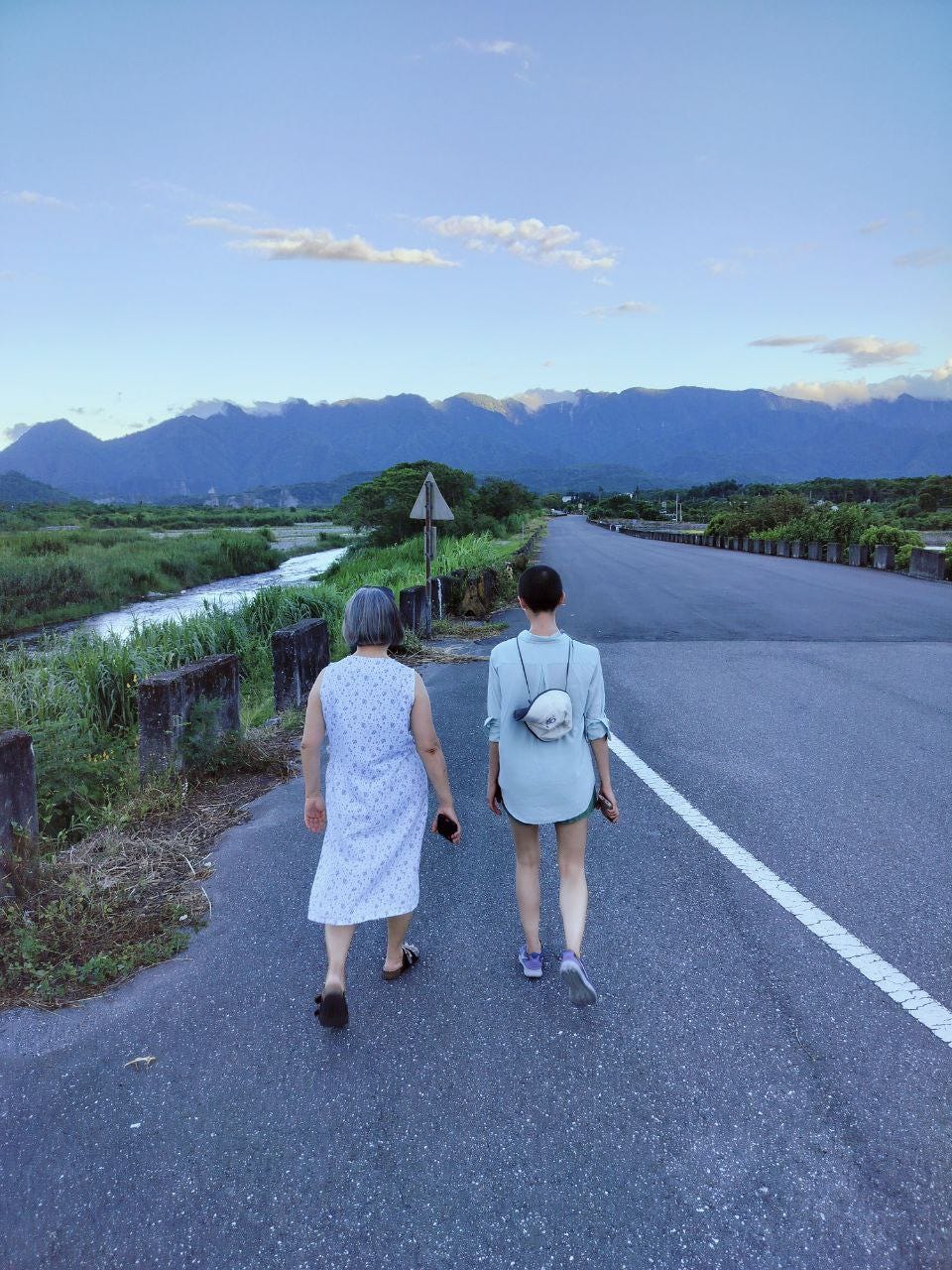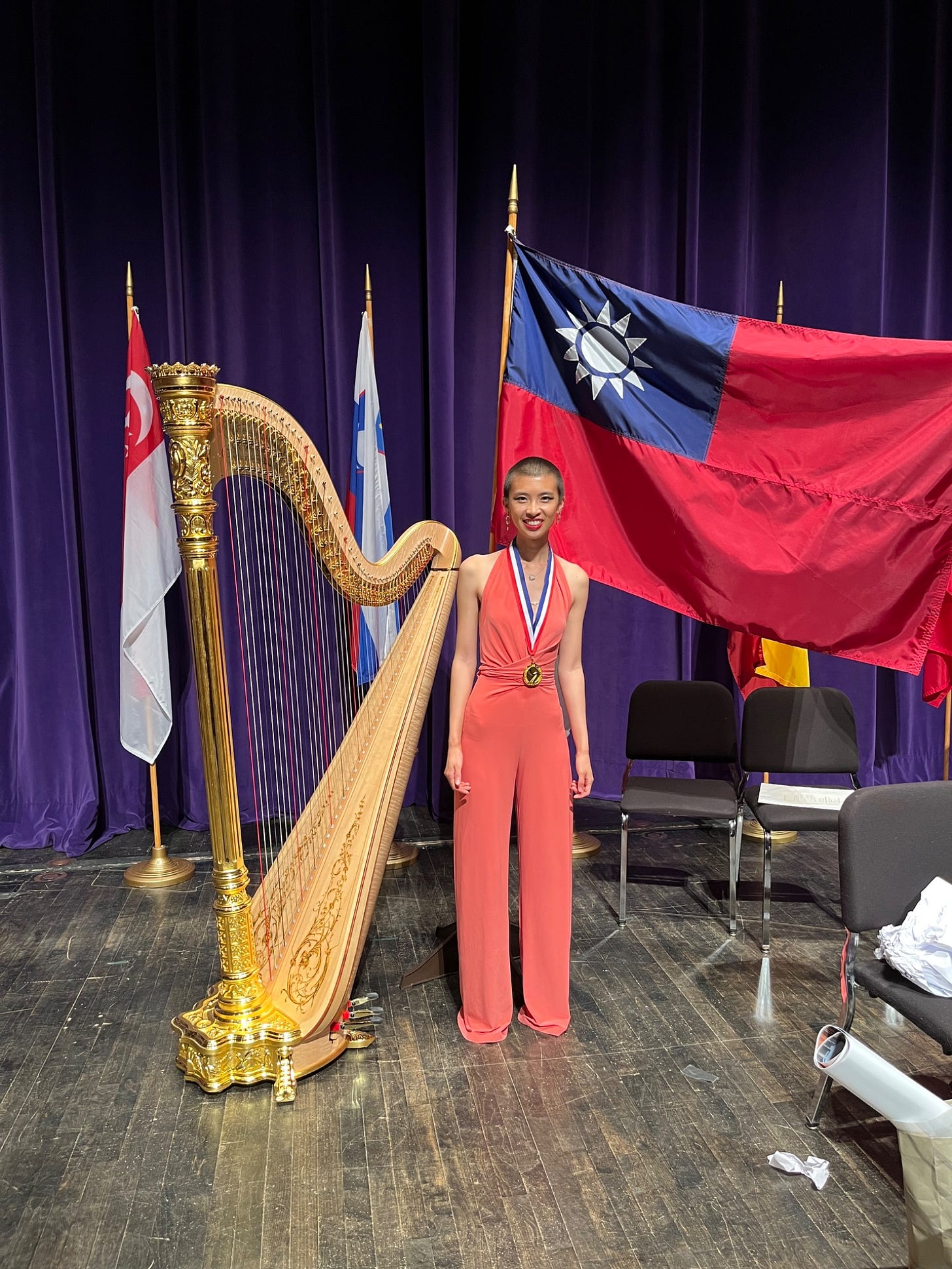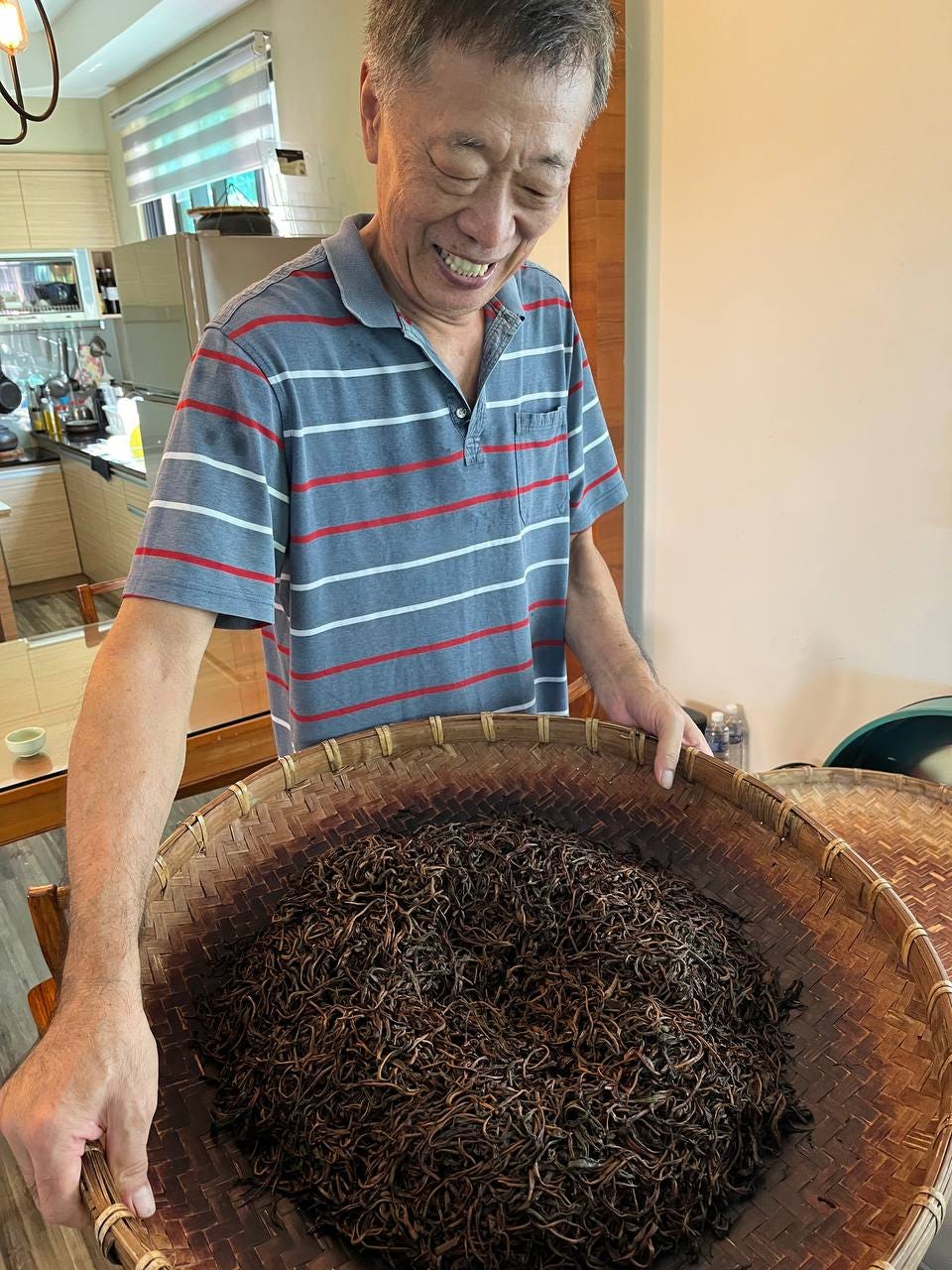E.T. phone home
a silly string of letters (epistles or phonemes? read more to find out 🙃) and a trip to Taiwan teach me the difference between being domiciled and feeling at home
A few days before my month-long excursion from Toronto to Tallahassee to Orlando to Taipei, I finally submitted my Canadian citizenship application, along with various documents and a letter explaining why I am domiciled in two countries (US and Canada). At the end of the day, I wrote, Canada is the place I identify most as my home since that's the one place Patrick and I have made our life together.
The truth is, “home” doesn't so much conjure a romantic symbol of rootedness as spelling out its letters unfurls an onslaught of poststructural word associations. H-O-M-E, hohm, homing pigeons, hovering, phoning parents, phoning home, phoneme, phenomenology of home, phon, foam, foamy, phony, form, firm, fir, furred, pferd, Pfeffernüsse. I think this linguistic mutation really tells a story of migration, as in, I'm more inclined to home than to ever feel at home.
return to the motherland
Last month, I flew to Taiwan for the first time in nine years. I had been invited to perform some recitals for the Taiwan International Harp Festival and the Monamis Harp Ensemble/Chimei Arts Museum, but the other reason for the trip was what many of us second-generation immigrant kids call the spouse tour, i.e., bringing a new spouse to the motherland to introduce to the extended family. Patrick and I had delayed The Tour for a lot of reasons (no time, no money, COVID), so year 5 of being married seemed like an auspicious time to finally get it done.
When I was young, my mother used to bring me and my older sister back to visit my relatives, often for six weeks at a time. We'd stay at my waipo's house in 瑞穗 (Ruisui), a small town nestled alongside the 秀姑巒溪 (Xiuguluan River) in Taiwan's East Rift Valley, and pass the time doing Chinese and math homework and watching dubbed cartoons with our younger cousin. Air conditioning was expensive, so we'd drink sticky sweet 冬瓜茶(winter melon tea) to cool ourselves in the relentlessly damp heat. Living in Florida now, I always think of Taiwan on the most humid days. If I walk to the right spot and close my eyes, I can smell those childhood summers in Ruisui.

In 2012, I received my Taiwanese national ID card, which meant I could vote, work, and live in Taiwan. By the principle of jus sanguinis, children of Taiwanese expats are automatically considered Taiwanese nationals, but to have citizen rights, you need to have household registration/national ID card (a Taiwanese passport without a national ID number is essentially a ceremonial document).
After 2012, I started representing Taiwan in harp competitions—one, to express national/cultural pride (also, the harp community in Taiwan is 💪🏼💪🏼💪🏼) and two, to comment on what I felt was implicit racism at some of these competitions. At national competitions, I felt like I wasn't seen as American enough (visually, aesthetically, musically) to meet the (usually white) jury's expectations. At international competitions, I was often asked whether I spoke English, even when my name tag explicitly said I was from the United States. I thought, if these people look at me and only see a yellow face, then that's what I'll choose to show up as, and I'll be damn proud of it.

trying to find home on the map
When Patrick and I flew back home (Toronto), I joked to him—while fumbling in my bag for which travel document to use—that I couldn't keep track of my national loyalties. Holding multiple passports is such a rarified privilege (hell, holding one passport is already a privilege) and often seen as a very cosmopolitan thing—more so when they're used to jet between places and no loyalties are on the line. As someone with strong homebody tendencies, I've never had much desire to be cosmopolitan; it all just seems too glib and not existential enough. So I shout into the void, Home has to mean something!!!
Home is the Bay Area, where I was born and grew up. Home is the house my parents still live in; home is in East San Jose, where Asian and Hispanic immigrants still outnumber white people, which meant my childhood food experiences were dumpling and pho restaurants and Mexican charbroiled chicken. Home was where I first learned to speak Mandarin, years before I was comfortable talking in English.
When I was 16, I left California to attend university in central Illinois, not prepared for the culture shock that comes with being a coastal city person in the middle of a cornfield. I learned that wind chill is a bitch; that kids from the suburbs who say they're from Chicago aren't actually; that Midwestern hipsters love craft beer and Sufjan Stevens. Illinois was where I found out about stuff white people like. Even though I had traveled to Europe quite frequently as a teenager, living in Illinois taught me to code-switch as a yellow person in white spaces.
I moved to the East Coast, then back to the Midwest, then immigrated to Ontario. Thinking Canada was going to be my forever home, I adapted to new spellings (labour, not labor), new traditions (Boxing Day), and new histories (British colonialism, e.g., so much Dundas). Our first apartment was so close to the Labatt Brewery that, on certain days when the wind was blowing just right, we could smell the fermenting grain while admiring the Canadian flag whipping in the breeze. I still have yet to buy a two-four or memorize all the words to “O Canada,” but five years later, I can identify a hoser, tell you the correct usage of eh, and pronounce out with a Canadian accent (among other things).
Two years ago, I moved again to Florida. Tallahassee is technically where I spend the most time in the year, so when the Canadian border guard asks me where I live, I always pause because I don't really know what to say. Where I am domiciled is a technicality on a piece of paper—something that matters a lot to the bureaucracy of a nation-state, but it doesn't really say much else about a person.
Home is a point of origin (my parents, San Jose). It is a person (Patrick). It is the location of a residence, the nexus of a social & professional life (Tallahassee). It is, as I experienced during my trip in Taiwan, also where one finds one's soul. However, home of the soul isn't the same as home of the heart. I interpret “home is where the heart is” more as a statement of conscious desire; as in, one has to first know what one wants before locating home.
Home of the soul isn't always conscious. It's where one's body has to recognize a home, feel at home. It's where the parts of oneself that never seemed to belong anywhere else, upon arriving somewhere, suddenly make sense.
can we get some service around here?
During my trip, I realized what makes me feel at home is a certain kind of generosity. Taiwanese people, even in urban areas, tend to be friendly and solicitous, concerned about people's well-being and comfort. Generosity can be tied to the notion of saving face (social status performance), as in, giving more makes you look better to others, but for the most part, I think the underlying motivation is to make people feel cared for. As a result, there is a lot of giving and taking favors. For example, someone will treat you to a meal with the expectation that you will return the gesture the next time. It's a social code of reciprocity that knits relationships across generations.
Owing a favor isn't so much a burden as it is a lingering promise to re-connect.
Often when my mother and I argue, she accuses me, à la Joy Luck Club, of being “too American” (willful and individualistic) to really be Taiwanese, and I've always taken that notion for granted. However, reciprocal generosity, which is a fundamental part of Taiwanese culture, has this gravitational pull: it totally makes sense to me! In Taiwan, you can't step inside someone's home without being offered a big plate of fruit or a cup of tea. It's normal to be included on food orders without being asked to pay (though part of the dance is knowing that you should offer to pay, or if with close friends/family, you sneak cash into their bag when they're not looking so they can't refuse).
There is something inhospitable and lonely about being squared away—of not being beholden, of maintaining that transactional boundary between you and me—that is more prevalent in the US/Canada. Taiwan isn't a social utopia by any means; neoliberalism has done its damage there, too. However, it offers a home of the soul in a way that North America—where I was born, grew up, and live—never has. Perhaps it's also because, when people in Taiwan see my face, they speak to me in my mother tongue. Is it weird to feel familiar in an alien place but alien in a familiar place?
(Keguro Macharia also talks about this vis-à-vis visiting Kenya in On Quitting, which I've referenced in a previous post)
To close this post, I'd like to share some vacation highlights, made possible by some of the most generous individuals:
Nanyuan concert + stay: Shannon Chieh was kind enough to arrange a concert hosted by the folks at One Nanyuan, a small idyllic mountain resort outside of Hsinchu. In addition to enjoying some incredible Hakka cuisine-inspired meals (interesting uses of local herbs and condiments), I got to experience a traditional Chinese medicinal soak in a comically large bathtub, ending with a glass of refreshing starfruit juice. Strangely, the most inspiring foods were all liquids: local cold-pressed flaxseed oil as a starter at breakfast, followed by milk tea made out of roasted weeds; chicken broth steeped with tea leaves; local coffee (Taiwanese beans tend to be very light roast, super woodsy/floral aromas).
Tainan seafood banquet: My uncle (by marriage)'s older brother, whom we all call A-beh #2 (二阿伯) even though he's not actually related to my family, hosted a truly extravagant dinner after my concert in Tainan, complete with abalone, dried fish roe, scallop and crab sticky rice, fresh shrimp and fish, and shark fin soup. For Chinese people, specific ingredients indicate both the status of occasion and the importance of the guests (the more expensive the ingredients, the more important the occasion/guests). It's one part of the culture I don't quite understand, but still, Patrick and I felt quite honored to be invited to this meal.
Nature walks (Xitou, Sun Moon Lake, Taitung coastal highway) + Puli visit: Taiwan is a mountainous island, so thanks to my uncle who drove us literally around 2/3 of the island, we got to do some mountain hiking, visit Buddhist temples, and walk along the Pacific Ocean. We were lucky to stay at a bed-and-breakfast operated by Lewis, a friend of my uncle and retired naval officer, who moved from Kaoshiung to the rural outskirts of Puli almost 10 years ago. After discovering mature tea trees on his property, he started making his own small-batch black tea (紅茶 or “red tea”). For our first dinner, his wife prepared seasonal water bamboo (茭白筍), which I've never even seen in North American Asian grocery stores but absolutely loved.

So. Much. Food. Night market treats, Taiwanese-style dim sum, shaved ice, tofu custard, bubble tea from the OG bubble tea shop, the best stinky tofu (in Yuli), braised pig's knuckles and pork belly, fresh soy milk, Japanese gin martinis, shabu-shabu, endless fruit…
Taiwanese people love good food, and I think it's less about gluttony than it is about hospitality. After all, serving something not tasty would be unimaginably rude. 😅 For now, I'm content to archive my food memories and slowly savor them until my next trip, there's one thing I may try this year:
When I used to teach writing to middle-school students, I often asked them to pick a strong childhood memory on which to write descriptive essays. Strong memories are powerful because they're highly sensory and evocative, and it's those evocative instances that tend to inspire us to do and to think just a little differently.
The most evocative memory from my trip was sitting on Lewis's front porch, at a table made from a reclaimed tree trunk, drinking tea and chatting with him and his wife before dinner. We had just arrived, and it had started to rain—a typical summer storm. We hadn't seen the tea fermentation basket yet, but Lewis mentioned that the tea leaves he was measuring into the teapot were made from trees behind the house. We watched his wife boil the water; she poured it into a little teapot, explaining to us that the first steep was to bloom the leaves, and the second was to extract flavor. Someone lighted a sandalwood incense stick to ward off mosquitos, and we drank the tea.
It really was the best tea I've ever had, but the magical part of it was the ritual of gathering, watching someone put care into making something for you, and sharing that thing together. It felt like pressing pause on the day, and in a frozen moment, you can all the time in the world to try to understand the person sitting in front you.
I wonder how I can impart that convivial hospitality to my teaching this year, to figure out how to be generous with my time in ways that won't impoverish my well-being (that balance is hard). Is the magic in the Chinese tea set? Perhaps I'll bring one into my office and start holding afternoon tea so that my students can experience what I felt on that porch in Puli.
Maybe it's a chance for me to learn something new about them. Maybe it's a chance for them to learn something new about themselves.
live long & prosper,
✨ Noël Éternel 🎅🏼 🎄
This week's Corner of Wondrous and Powerful:
Listening: brat by Charli XCX (like everyone else in June) and VANTABLACK by Lalah Hathaway
Watching: original Frasier, for the 4th time
Reading: Fugitive Pieces by Anne Michaels. GO READ IT. NOW.
Is there a woman who will slowly undress
my spirit, bring my bodyUntil the lemon bending the branch, the weight of the shadow separating one leaf from another, presses that place in you. Until the hills burn your eyes, until you give in. Until the seam of density that separates leaf from air / is not a gap, but a seal.
Is there a woman who will slowly undress
my spirit, bring my body to belief
(ugh why does her writing tear me apart)










